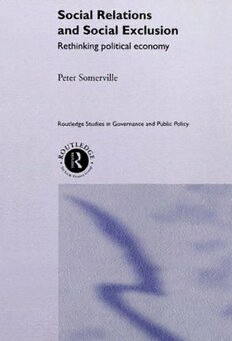
Social Relations and Social Exclusion: Rethinking Political Economy PDF
Preview Social Relations and Social Exclusion: Rethinking Political Economy
Social Relations and Social Exclusion Social Relations and Social Exclusion sets out a new approach to understanding society, based on rational choice theory. Starting from a few simple assumptions about the nature and context of human action, this book provides a complete reinterpretation of our major social institutions. Its central aim is to see how far social relations can be explained on the basis of human beings acting in their own interests rather than as helpless puppets of wider social forces. The institutions examined by the book include households, communities, workplaces, social classes and the state. In each case, it is shown how the institution forms a context within which social interaction can be explained in terms of the rational decision taken by the actors involved. A key question in the book is why people choose to enter into social relations in which they are exploited, and the question is answered mainly by reference to established forms of rule that lead people to believe they have no choice. The book criticises the current form of such rule in Britain, arguing strongly that it does not have to be like this. It argues for a rethinking of social policies, based on sound principles of universal human liberation. Peter Somerville is Professor in Social Policy at the University of Lincolnshire and Humberside. He has published widely on issues of housing, social exclusion and community empowerment. http://avaxho.me/blogs/ChrisRedfield Routledge Studies in Governance and Public Policy 1 Public Sector Ethics Finding and implementing values Edited by Charles Sampford and Noel Preston with Carol-Anne Bois 2 Ethics and Political Practice Perspectives on legislative ethics Edited by Noel Preston and Charles Sampford with Carol-Anne Bois 3 Why Does Policy Change? Lessons from British transport policy 1945–99 Jeremy Richardson and Geoffrey Dudley 4 Social Relations and Social Exclusion Rethinking political economy Peter Somerville Social Relations and Social Exclusion Rethinking political economy Peter Somerville London and New York First published 2000 by Routledge 11 New Fetter Lane, London EC4P 4EE Simultaneously published in the USA and Canada by Routledge 29 West 35th Street, New York, NY 10001 Routledge is an imprint of the Taylor & Francis Group This edition published in the Taylor & Francis e-Library, 2001. © 2000 Peter Somerville All rights reserved. No part of this book may be reprinted or reproduced or utilized in any form or by any electronic, mechanical, or other means, now known or hereafter invented, including photocopying and recording, or in any information storage or retrieval system, without permission in writing from the publishers. British Library Cataloguing in Publication Data A catalogue record for this book is available from the British Library Library of Congress Cataloging in Publication Data Somerville, Peter. Social relations and social exclusion: rethinking political economy / Peter Somerville. p. cm. Includes bibliographical references and index 1. Social institutions. 2. Rational choice theory. I. Title. HM826.S65 2000 306–dc21 00–042220 ISBN 0–415–24040–9 (Print Edition) ISBN 0-203-18497-1 Master e-book ISBN ISBN 0-203-18506-4 (Glassbook Format) Contents List of tables vii Preface ix Acknowledgements xi 1 Introduction: a theory of social relations 1 2 Households and families 13 3 Communities and community development 48 4 Contractual relations and social divisions 88 5 State–citizen relations and social justice 112 6 Policy implications: the case of housing 144 7 Conclusion 165 Bibliography 183 Index 205 Tables 2.1 Distribution of household financial management systems 26 3.1 Types of social relations 51 3.2 The relative power of locals and newcomers 64 6.1 A typology of housing regimes 145 Preface This book came to be written as a reaction against the widespread view that sees human beings as the creatures of impersonal social forces such as the market, the state and class struggle. While not wishing to deny the powerlessness of so many individuals in the face of the overwhelming might of mass organisations, this book argues uncompromisingly that we are not victims of such powers except insofar as we choose to be so. Our choices are constrained by the contexts within which we act, but these constraints do not enslave us. Far from it: contexts themselves provide opportunities for action and therefore make liberation possible. The message of this book is that freedom in this sense is personally and politically achievable. Peter Somerville University of Lincolnshire and Humberside
